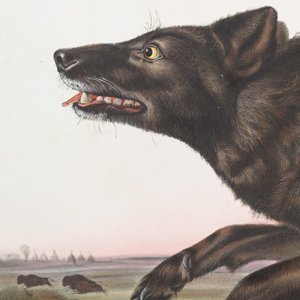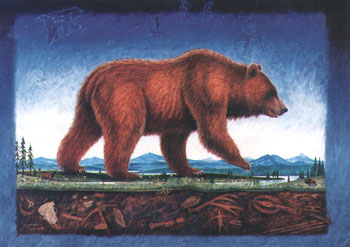Born in St. Louis, Missouri, in 1864, Charles M. (“Charlie”) Russell arrived in Montana as a 16-year-old youth, intent on fulfilling his dream of becoming a real, working cowboy. Lewis and Clark Meeting the Flatheads, painted in 1912, is Russell’s largest work.
Featured Works
Cameahwait’s Geography Lesson
by J. I. Merritt

When Meriwether Lewis and William Clark encountered the Shoshone Indians in August 1805, one or the other—or more likely both, sat down with Cameahwait, the chief of the tribe’s Lemhi band, to learn as much as possible about the region’s geography.


They didn’t get credit for it, but Lewis and Clark were the first to describe these wily canine predators.
Grizzly Gallery
Art featuring the iconic bear

. . . a small collection of paintings of grizzly bears by contemporary as well as traditional Western artists.
Bison Gallery
Art featuring the iconic buffalo



“our guide could not speake the language of these people but soon engaged them in conversation by signs or jesticulation, the common language of all the Aborigines of North America.” Lewis exaggerated the universality of sign language, which was mainly employed by tribes of the Great Plains.


The story behind Charles M. Russell’s 1912 painting of the expedition meeting the Bitterroot Salish at Ross’ Hole, one of the great works of Western American art.


On the Upper Missouri, the changes since the years Lewis and Clark traveled here have been less obvious perhaps, but no less remarkable.


Lewis writes: “the bier in which the woman carrys her child and all it’s cloaths wer swept away as they lay at her feet she having time only to grasp her child.” This bier, then, is a bar or net serving to keep mosquitos from one’s personal blood supply.
Experience the Lewis and Clark Trail
The Lewis and Clark Trail Experience—our sister site at lewisandclark.travel—connects the world to people and places on the Lewis and Clark Trail.
Discover More
- The Lewis and Clark Expedition: Day by Day by Gary E. Moulton (University of Nebraska Press, 2018). The story in prose, 14 May 1804–23 September 1806.
- The Lewis and Clark Journals: An American Epic of Discovery (abridged) by Gary E. Moulton (University of Nebraska Press, 2003). Selected journal excerpts, 14 May 1804–23 September 1806.
- The Lewis and Clark Journals. by Gary E. Moulton (University of Nebraska Press, 1983–2001). The complete story in 13 volumes.


